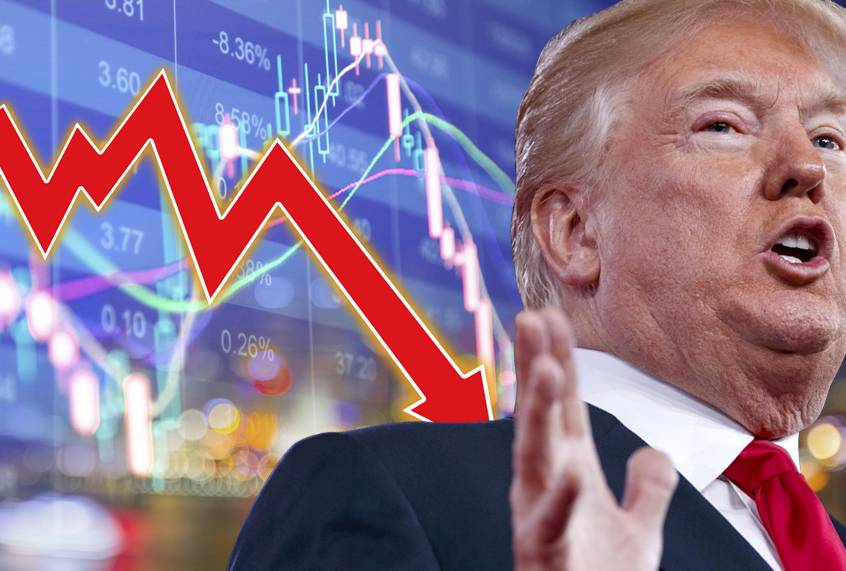It is a truth universally acknowledged that a politician who desires the presidency must be in want of the good graces of Wall Street. Jane Austen would surely appreciate the fickle romance between the president and his Wall Street coevals, a relationship that has had its ups and downs since the incumbent was but a wee candidate. (Do not speculate which one is Mr. Darcy and which one is Elizabeth Bennet; the metaphor becomes too horrifying when stretched so literally.) And with the departure this week of Trump’s economic advisor, former Goldman Sachs executive Gary Cohn, the Trump–Wall Street relationship has begun to sour again.
Just as Elizabeth Bennet had an early mistrust of Darcy, these two parties started off on the wrong foot. During the campaign days, Trump took pains to paint Hillary Clinton as the Wall Street candidate. “#CrookedHillary is nothing more than a Wall Street puppet!” Trump wrote on Twitter in October 2016, just weeks before Election Day. This was a recurring theme for him:
Crooked Hillary is flooding the airwaves with false and misleading ads – all paid for by her bosses on Wall Street. Media is protecting her!
— Donald J. Trump (@realDonaldTrump) August 22, 2016
Clinton betrayed Bernie voters. Kaine supports TPP, is in pocket of Wall Street, and backed Iraq War.
— Donald J. Trump (@realDonaldTrump) July 25, 2016
“Clinton betrayed Bernie voters. Kaine supports [the Trans-Pacific Partnership], is in [the] pocket of Wall Street, and backed Iraq War,” he wrote in July 2016.
He was right, to some degree: Hillary Clinton was the “preferred candidate” of Wall Street, as Ben Norton wrote in Salon in 2016. This proved true through the end of the campaign; the nonprofit Center for Responsive Politics, which tracks presidential campaign spending patterns, noted the disparity between finance industry donations to the two candidates. By the time the dust had settled, Donald Trump had reaped an estimated $37,873,136 in donations from the “Finance, Insurance and Real Estate Industries,” while Clinton had amassed $117,318,552 from the same industries.
It didn’t take very long after Trump’s win for the tides to turn. (Perhaps unsurprisingly — Trump is a billionaire real estate guy with a Freudian affinity for gold; Wall Street is his people.) Trump appointed oodles of Wall Street insiders to his administration, and the industry grew to love the new president pretty quickly. The liberal-left media was eager to point out the hypocrisy here; just two weeks after Inauguration Day, in February 2017, Steve Benen wrote in MSNBC:
As it turns out, Trump magically transformed soon after winning the election, tapping industry insiders to help run his administration, and even inviting a Wall Street insider to oversee Wall Street. Today, the new president is going even further, delivering on one of the financial industry’s top policy priorities.
That was a fast make-up, wasn’t it? The “top policy priority” Benen referred to specifically was the unmaking of the Dodd-Frank law, which was passed in 2010 in an effort to stave off future recessions akin to the 2008 crisis — which was in part caused by an underregulated finance sector. As the Wall Street Journal noted in February 2017:
President Donald Trump on Friday plans to sign an executive action that establishes a framework for scaling back the 2010 Dodd-Frank financial-overhaul law, part of a sweeping plan to dismantle much of the regulatory system put in place after the financial crisis. […] Mr. Trump also plans another executive action aimed at rolling back a controversial regulation scheduled to take effect in April that critics have said would upend the retirement-account advisory business.
At the same point in time, Trump had appointed the aforementioned Gary Cohn to be his White House National Economic Council Director.
Throughout his first year in office, Trump generally and dutifully did Wall Street’s bidding. Nature may abhor a vacuum, but Wall Street loves a (regulatory) vacuum; the governing economic philosophy of the Trump administration had generally been in line with the general free market fundamentalist wisdom of rolling back any and all federal regulations, lowering taxes on corporations and the rich, and privatizing anything and everything in sight. Trump was good for Wall Street and Wall Street was good to Trump — and the finance fatcats were content to ignore Trump’s unhinged comments and/or xenophobic ur-fascism, as long as the market was bullish.
Which brings us to today, when the two face a lover’s spat. Turns out that Trump’s xenophobia wasn’t all just politically popular bluster — Trump was actually going to follow through on his protectionist promises to enact tariffs. That’s cause for a breakup.
One cannot exaggerate the degree to which the tariffs miffed the free market fundamentalists on Wall Street and those within the Republican Party. Charles Koch of the Koch Brothers, the pursestrings of so many right-wing causes, was apoplectic: “[free trade] has been essential to our society’s prosperity and to people improving their lives,” Koch wrote in response. Paul Ryan, fuming at Trump for betraying his capitalist religion, had to assuage Wall Street’s fears; Barron’s analysts believed that Trump’s tariff suggestion caused a market dip that only recovered later in the day due to Ryan’s sermonizing.
Cohn’s resignation earlier this week seemed symbolic of the end of Trump and Wall Street’s bad romance. Who can blame the spurned lovers on Wall Street? Wall Street abhors unpredictability; it’s bad for business. And Trump is as volatile a lover as they come. He’s also spent his entire life as an entitled, spoiled child used to getting whatever he pleases, beholden to no one but himself and his ego. If he wants to push his protectionist agenda, a few harsh words from Goldman Sachs execs won’t stop him.

